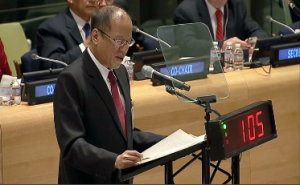
(ENS) – President Benigno Aquino addressed the international community at the United Nations (UN) Climate Summit on Tuesday (September 23), urging countries to “do everything they can to address climate change.”
The Climate Summit is meant to add political momentum to a U.N. process to negotiate a climate-change agreement in Paris by 2015, and Aquino took this as an opportunity to remind world leaders of their shared responsibility to find a solution to the issue.
Aquino said the Philippines, which felt the wrath of typhoon Yolanda (international name Haiyan) in late 2013, carry a disproportionate large burden when it comes to climate change despite it not being a major emitter of greenhouse gasses.
Citing the Philippines’ experience with typhoon Haiyan, Aquino called called for a global coordinated effort to address climate change noting that with the changing climate, both big and small nations become vulnerable to its ill effects.
“The choice before us, then, is clear: Together we must face these challenges and surmount them, or together we will suffer the consequences of inaction,” the President said in his speech at the United Nations Climate Change Summit on Tuesday at the UN headquarters in New York.
He also urged leaders to take action immediately.
Nations should not engage in another protracted debate over the individual commitments of countries, he said adding it would be a wrong framework to address the issue.
“Instead, everyone here has to do everything they can to address climate change, without first waiting for their neighbors to engage in action,” he said. “Doing anything less leaves the problem unattended, too, thereby increasing the problem we all face.”
Aquino added that his country wishes to accelerate its efforts to combat climate change.
“We have never lacked to resolve for example as regards transitioning towards less traditional sources of energy. What we lack is the access to technology, financing and investment that will allow us to accelerate our strategy. I believe the challenge before us is to innovate on ways in which transfer of useful technology in building climate smart infrastructure might be achieved under a global unity of effort,” he told world leaders attending the summit.
Philippines was hit last year by super typhoon Haiyan that killed 6,100 people.
Some 200,000 families were displaced by the typhoon, one of the strongest ever recorded in history.
But there had been questions on how fund and other donations for Haiyan victims coming from other countries had been used by the national government.
The President claimed that his government had been addressing climate change to the maximum with its limited resources. Legislation has been enacted to lessen the impact of disasters by adopting a comprehensive approach to disaster response, Aquino said.
He said the government has also improved its weather forecasting so that it could send timely warnings to vulnerable communities.
For national and local authorities and residents, the government has undertaken multi-hazard and geohazard mapping, which is integral to the effective assessment of risks, according to the President.
It is also carrying out a massive national re-greening program and intensified the crackdown on anti-illegal logging activities.
He said that to reduce the impact of disasters on the poorest and most vulnerable Filipinos, the government engaged other stakeholders in developing a disaster risk financing and insurance policy framework.
“Perhaps the international community may see the value of such an instrument, and look at it as a model to increase the financial resiliency of other nations in a similar situation to ours,” the President said.
The Philippines also has to continue to take steps to maintain and even improve the country’s low-emission development strategy and the trajectory of its energy mix, the President noted.
“And we are hopeful that our fellow developing nations, especially those who have been gaining the economic wherewithal to pursue similar strategies, will tread a path akin to ours,” he said.
Climate change does not recognize national boundaries, or political or economic affiliations, he added. (Eagle News Service with a report from Reuters)







